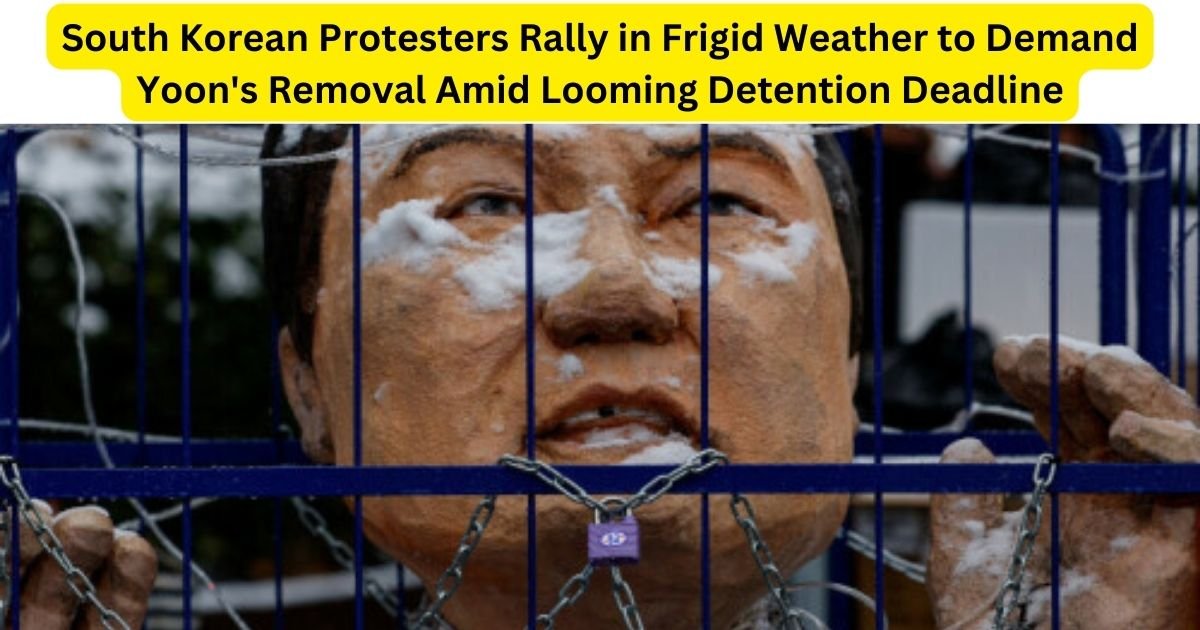Hundreds of South Korean protesters braved freezing temperatures and snowfall overnight on Sunday, gathering near the residence of impeached President Yoon Suk Yeol to demand his ouster and arrest. With a court-issued detention warrant against Yoon set to expire on Monday, tensions are mounting between authorities and the presidential security service.
Last week, investigators from the Corruption Investigation Office for High-Ranking Officials (CIO) and police officers attempted to detain Yoon at his residence in Seoul. However, the effort was thwarted after a five-hour standoff with the presidential security team, which has been accused of shielding Yoon from the law.
The CIO is considering rebellion charges against Yoon following his controversial decision to impose martial law on December 3. Frustrated by opposition lawmakers blocking his policies, Yoon deployed troops to surround the National Assembly, an act that was swiftly condemned by legislators who overturned the martial law declaration and impeached him on December 14.
A Seoul court issued a warrant to detain Yoon and search his residence after he defied orders to appear for questioning. However, enforcing the warrant remains challenging as Yoon continues to take refuge in the official presidential residence, where security measures have intensified.
Over the weekend, security personnel installed barbed wire fences around the residence’s perimeter, preparing for a potential second detention attempt. Meanwhile, protesters demanding Yoon’s arrest clashed with pro-Yoon supporters in nearby streets. Police barricades and buses were deployed to separate the opposing groups.
Kim Eun-jeong, a prominent activist, criticized the authorities for failing to enforce the detention warrant. “With only a day left before the warrant expires, the presidential security service is hiding a criminal, and the CIO appears reluctant to act,” she said during a rally.
Park Chan-dae, a leading member of the opposition Democratic Party, also urged the CIO to act decisively. “The delay in detaining Yoon shows a lack of urgency from the authorities,” he said.
The CIO has urged Deputy Prime Minister Choi Sang-mok, who is acting as the interim leader, to direct the presidential security service to cooperate in executing the detention warrant. However, Choi has yet to make any public statements regarding the issue.
Presidential security chief Park Jong-joon defended his team’s actions, stating that their priority is to protect the president. “We are fulfilling our legal duty to safeguard the incumbent president,” Park said, dismissing allegations that the security service has become Yoon’s personal defense force.
The CIO and police accused Park and his deputies of obstructing official duties, a charge that could have legal consequences. While the security service is mandated to protect the president, legal experts argue that preventing a court-ordered detention could constitute an unlawful act.
On Friday, the standoff escalated when investigators and police managed to get within 200 meters of Yoon’s residence before being blocked by barricades formed by security personnel and troops. The acting defense minister, Kim Seon-ho, voiced concern over the use of military personnel to prevent Yoon’s detention, warning that such actions are inappropriate.
Several top officials, including Yoon’s defense minister and police chief, have already been arrested for their roles in enforcing the martial law decree. However, Yoon’s legal team remains defiant, accusing the CIO of overstepping its authority.
Yoon’s lawyers plan to file complaints against the CIO’s chief prosecutor and other officials involved in the detention attempt. They argue that the detention and search warrants cannot be enforced at Yoon’s residence, citing legal protections for sites linked to military secrets. Additionally, they question the CIO’s jurisdiction over rebellion charges.
The Constitutional Court is currently deliberating Yoon’s impeachment case, which will determine whether he is permanently removed from office or reinstated. In the meantime, South Korea remains gripped by political uncertainty as the detention deadline looms.
Read More News:
